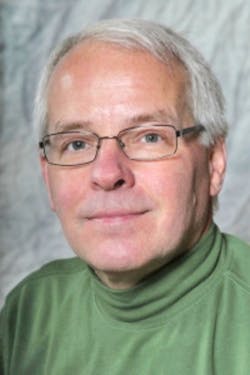When thinking of the Internet of Things, don’t think of things
Boston, MA. Cees Links had a problem. Shortly after having a “smart meter” installed in his home, a hot-water pipe burst. The meter should have detected an unusually high pattern of water usage, as well as an unusually high level of gas usage to heat the water. It should have been simple to compose a text message alerting Links to the problem, but of course that didn’t happen, and significant flooding and damage ensued.
Wi-Fi pioneer Links presented this anecdote April 19 in a keynote address on the IoT and engineering jobs at ESC Boston. He was responsible for convincing Steve Jobs to add wireless-LAN capability to Apple computers in 1999 and now serves as general manager for wireless connectivity at Qorvo, which in 2016 acquired a startup Links had founded.
The smart meter, he said, was only able to send a “smart bill” at the end of every month. The sensors worked fine, he said; what was missing was the big picture, involving not just sensors but AI, user databases, and management and control systems. “What is getting more important for engineering jobs is understanding the system and how things interrelate,” he said. “A fitness band is not about a ‘thing’ but about lifestyle coaching. A smart home is not about sensors but about making better decisions faster.”
Links commented on the IoT’s effects on jobs in general and on engineering jobs in particular. He noted that during the first industrial revolution one spinning machine could put 100 people out of work, but it also made clothing affordable. We are still contending with issues such as whether AI-based computers will put engineers out of jobs and whether any benefit will ultimately be worth the cost.
New technology doesn’t automatically create a better world, he said; there are not only winners but losers. He cited Mark Zuckerberg’s recent testimony before Congress as an example of coming to grips with technology’s impact on our lives. The Internet can be like the Wild West, he said, without even a pirate’s creed, leading to various security concerns.
“I personally believe security is not something the Internet [community] can solve itself,” Links said, adding that it needs rules and regulations. The challenge is that even engineers don’t fully understand the Internet; how can legislators be expected to?
He cited the concept of the secrecy of correspondence, prevalent in western cultures, in which the content of sealed letters is never revealed and letters in transit are not opened by government officials or any other third party, barring a search warrant, for example. Now, however, if you send an email message, you can expect your service provider to scan your message for keywords for use in targeting advertising. “In all fairness I think something is wrong,” he said.
Links noted that technical work still needs to be done on wireless communications. He said a boss once told him that no one would ever need data rates beyond 11 Mb/s. But he said, whatever hardware we come up with to deliver faster data rates, the software engineers will gobble it up (he added that he meant no offense to software engineers). He described the emergence of 802.11ax, with a distributed wireless infrastructure with one pod per room, delivering gigabit-per-second rates. But he noted that our data infrastructure in general is out of balance. In the real world, we have superhighways connecting our cities and small roads connecting houses within cities. With data, we have small roads leading up to our houses, which may have superhighways within. The IoT hierarchy needs to be re-established with, for example, 30 Gb/s into the house with 1 Gb/s per room.
He cited examples of benefits of the IoT. At one time, he said, he stood in line for three hours for tickets to Amsterdam’s Van Gogh Museum. Now you can go online and instantly book an entrance time. This benefits everyone, he said. You can use the time you save by not waiting in line to shop at markets near the museum.
He concluded with a reminder to avoid thinking only of “things.” A car is not a thing on four wheels, he said. It’s an ecosystem extending from drivers’ licenses to insurance companies. And in response to an audience question, he said, “As engineers we have an obligation to listen to what the effects are of what we dream up. We can not just throw it out there and let society fix it.”
About the Author

Rick Nelson
Contributing Editor
Rick is currently Contributing Technical Editor. He was Executive Editor for EE in 2011-2018. Previously he served on several publications, including EDN and Vision Systems Design, and has received awards for signed editorials from the American Society of Business Publication Editors. He began as a design engineer at General Electric and Litton Industries and earned a BSEE degree from Penn State.
